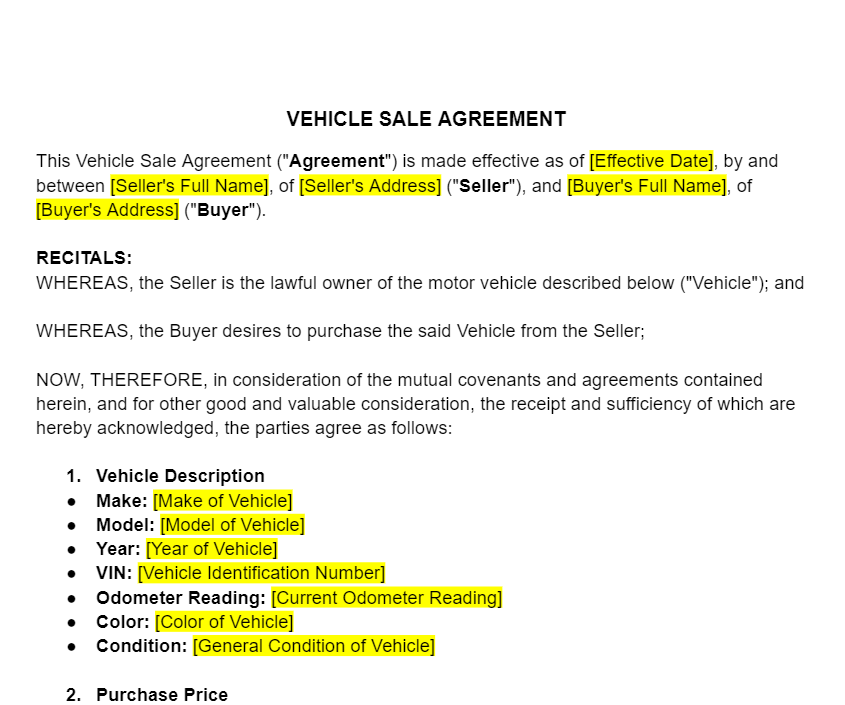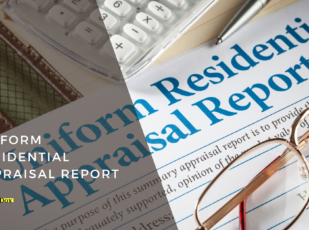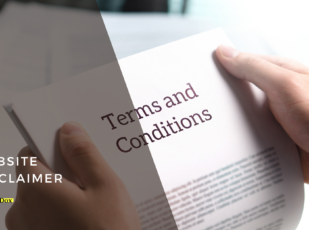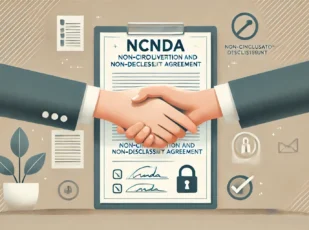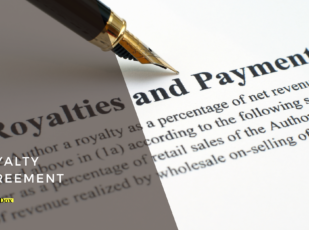
Sale Agreement for Vehicle Template
13 Downloads
Commercial
February 17, 2025
Sayantani Dutta
For a smooth and legally sound transaction when you are buying or selling a vehicle, a well-drafted Sale Agreement for Vehicle is the prerequisite. Also known as a Bill of Sale, this agreement outlines the terms and conditions of the sale, offering clarity and legal protection for both the buyer and the seller. In its entirety, the vehicle sale agreement details the vehicle’s condition, price, and other pertinent information, ultimately serving as a binding contract that governs the transfer of ownership.
Both parties need to avoid any misunderstandings and disputes—that much is a given. And for that, the car sale contract underlying the transaction needs to be robust. A proper, well-drafted car purchase agreement covers all bases comprehensively and outlines all clauses, terms, and conditions from the down payment to any warranty. In doing so, it ensures that the sale proceeds efficiently and transparently.
In this piece, we are going to cover the essentials of the car sale agreement and its importance. You will also find all about the risks associated with using an inadequate template to draft your final Sale Agreement for Vehicle while also learning about FreshDox.com’s superior solution—a car sale agreement template that is customizable to fit your needs and comprehensive enough to cover all bases.
The Importance of a Sale Agreement for Vehicle
First of all, this agreement is critical as it formalizes the transaction. A formal agreement is the foundation to ensure all aspects of the sale are clearly understood and agreed upon by both parties.
On one side, you have the seller—for which the Sale Agreement for Vehicle provides proof of the terms of the sale. This includes the agreed-upon total purchase price and condition of the vehicle. This has protected many sellers in the case of post-sale disputes or disagreements. On the other hand, you have the buyer. The vehicle sale agreement outlines the buyer’s rights regarding the vehicle purchase, including any warranties or guarantees.
There is also a legal requirement of having an agreement to transfer the ownership of the vehicle which this agreement confirms. Registration and tax obligations also require the vehicle details to be associated with the new buyer, which is why the Sale Agreement for Vehicle is so important.
Essentially, the agreement makes the motor vehicle’s ownership transfer smoother and more straightforward.
Any disclaimer or warranty that comes with a used car needs to be stipulated clearly in the terms of this agreement for it to be enforceable. Disputes and disagreements are the cause of ambiguities, especially in this situation where all terms and agreed upon before the parties sign. Any confusion or misunderstanding can open up the transaction to risks. That is why this lease agreement needs to be robust, comprehensive, and all-encompassing, leaving nothing to guesswork with the specifics of every clause, term, and condition.
Risks of Operating Without a Strong Sale Agreement for Vehicle
This legal document cannot be based on a generic car sale/purchase contract template you will find online. The purchase of a vehicle is a serious matter and you need clearly specified terms and conditions for every aspect here.
Skipping a solid vehicle sale agreement, or relying on a generic, incomplete template, can lead to a host of issues—some of which may not be immediately obvious but can turn into costly headaches down the road. Whether you are the buyer or the seller, proceeding without a well-defined contract leaves too much room for misunderstandings, disputes, and even legal troubles.
Generally speaking, these are the common issues that can arise in these situations:
Legal Vulnerabilities
Without a legally binding sale agreement, both parties are exposed to potential liabilities. For sellers, an informal or verbal agreement offers little protection if the buyer claims undisclosed defects or demands a refund. Buyers, on the other hand, may find themselves stuck with a vehicle that has hidden issues and no legal recourse to address them. A formal agreement ensures compliance with local laws governing vehicle sales and protects both parties from unexpected legal challenges.
Ambiguities in Payment Terms
A vehicle purchase involves substantial financial commitments, and without a clear contract, payment-related disputes can easily arise. Without specific clauses outlining the total purchase price, payment schedule, and any deposits or installment arrangements, sellers may face delayed or incomplete payments. Buyers could also end up paying unexpected additional costs if certain fees weren’t discussed beforehand.
Ownership Transfer Complications
Transferring vehicle ownership isn’t as straightforward as a simple handover of keys. Proper documentation is crucial to avoid future claims of ownership, unpaid fines, or liabilities linked to the vehicle. Without a sale agreement, the seller could still be held accountable for traffic violations or accidents that occur after the handover, while the buyer may struggle to register the vehicle in their name.
Condition of the Vehicle Becomes a Gray Area
One of the biggest risks of skipping a comprehensive sale agreement is the lack of a documented record of the vehicle’s condition at the time of sale. Buyers may later claim the vehicle was sold with undisclosed damages, or sellers might argue that post-sale issues aren’t their responsibility. A detailed agreement, with a clear description of the vehicle’s make, model, mileage, and any known defects, helps set expectations and prevents disputes.
Unclear Terms Regarding Warranties and Guarantees
If the sale agreement does not clearly define whether the vehicle is being sold “as-is” or with any warranties, it can create confusion and conflict later. Buyers may assume certain protections that the seller never intended to provide. A well-structured agreement explicitly states whether any warranties exist and what they cover, ensuring transparency and legal protection for both sides.
Disputes Over Additional Costs and Responsibilities
Expenses such as taxes, registration fees, and insurance coverage should be clearly allocated in the sale agreement. Without it, the responsibility for these costs can become a source of friction between the buyer and seller. A robust contract clarifies who handles these aspects, preventing last-minute surprises that could stall the deal.
Risk of Fraud and Misrepresentation
A formal vehicle sale agreement protects both parties from fraudulent claims and misrepresentation. Without one, buyers risk unknowingly purchasing stolen or encumbered vehicles, while sellers could face fraudulent payment methods or fake identities. A well-documented agreement includes verification checks and safeguards that ensure the legitimacy of both the vehicle and the transaction.
Sale Agreement for Vehicle: Key Elements
To be effective, a Sale Agreement for Vehicle needs to have several key elements. The exact details will vary, of course. But the entire agreement will have a few common sections. These include:
- Details of the Parties: The Sale Agreement for Vehicle begins with the full names and contact information such as the phone number of both the buyer and the seller. This can be referred to in case of any issues.
- Vehicle Description: The sale of the vehicle hinges on the correct description of the vehicle. This includes detailed information such as make, model, year, body type, Vehicle Identification Number (VIN), current mileage, odometer reading, and any distinguishing factors or description of any damage.
- Sale Price and Payment Terms: Next, the agreement will include the agreed-upon sale price of the vehicle, method of payment, down payment, and payment schedule. If there are monthly payments, then the agreement needs to specify that in detail so it can be enforced, or action taken in case of non-payments or delayed payments.
- Warranties and Disclosures: The seller will also need to set down any warranties being provided or any disclosures about the vehicle’s condition. A used vehicle is likely to have something that requires disclosure. Not disclosing it in the vehicle bill of sale itself can invite trouble down the line.
- Delivery and Acceptance: Lastly, the agreement will include the terms regarding how and when the vehicle will be delivered and accepted by the buyer (the final delivery date). After this, signs or esignatures can be taken and the agreement finalized.
Introducing FreshDox.com’s Vehicle Purchase Agreement Template
Say yes to successful and hassle-free vehicle transactions! FreshDox.com offers a professionally designed Sale Agreement for Vehicle Template. Developed by legal experts familiar with the nuances of vehicle sales and ownership transfer laws, our template provides a reliable, customizable framework for both individual sellers and automotive businesses such as car dealerships.
FreshDox.com users gain access to our Sale Agreement for Vehicle Template in both PDF and Word formats, alongside scores of other business-related and legal document templates. We offer easy customization to suit the transaction’s specific details.
What’s more, FreshDox.com also has a 14-day trial period that new users can use to check out our Basic and Premium Membership Plans. Basic Members can download up to three document templates a month whereas Premium Members enjoy unlimited downloads.
Using FreshDox.com’s Sale Agreement for Vehicle Template ensures that your vehicle transactions are conducted professionally, with all necessary legal protections in place. Sign up today to streamline your vehicle sales process and secure a smooth transfer of ownership with confidence.
Popular searches:
Related Templates
Discover more templates that align with your needs and preferences.

Ready to Sign Up?
Sign up for FreshDox.com’s 7-day trial and discover why so many individuals and businesses trust us for their legal document template needs.
- Cancel any time
- 7-day free trial
- From 300+ Customer Reviews

